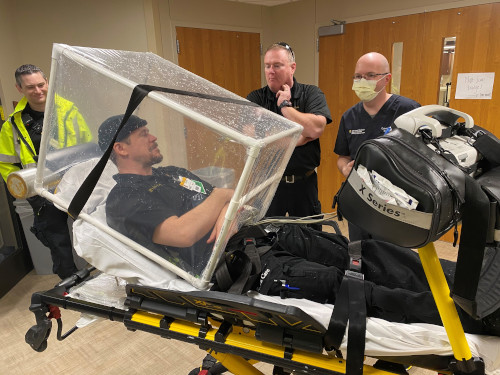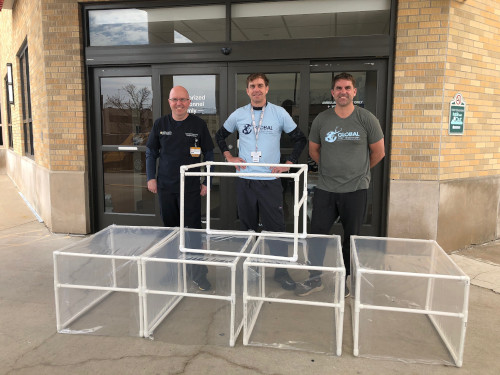While the UM System and many across our state, nation and world work to reduce interaction and incorporate social distancing measures, some industries—like health care— must still complete some of their work in-person. Those actively fighting on the front lines against the pandemic are well aware that better public health outcomes are what’s at stake. This is especially true for doctors like MU Health Care’s Adam Beckett.
“Due to use of telemedicine and community warnings, the ER's have been slower,” Dr. Beckett said. “Health care officials have really been pushing telemedicine, and it’s working out well. The protocols and system we have in place have done a good job keeping community transmission lower.”
Dr. Beckett works in the ER, but on his days off, he’s been coordinating with his non-profit Global First Responder (GFR) team to create respiratory protection chambers that keep health care workers from coming into contact with symptomatic patients.

MU Health Care staff try out the respiratory protection chambers designed by Beckett’s team.
In addition to the respiratory protection chambers, GFR is working with the Federal Emergency Management Agency and other companies to build mobile testing stations and other smaller projects to help fight COIVD-19.
“We’ve been working with WCS Homes: First Aid Global to build modules for testing centers. These are self-sustaining test centers built inside shipping containers that we can build here and can easily transport to other places that do not have any testing centers,” Dr. Beckett said.
Increasing the number of testing centers is one way to address worries about COVID-19. It can be easy for people to feel stressed when there’s uncertainty about COVID-19 looming, although following local guidelines will help the community be as prepared as possible to fight the pandemic. For Dr. Beckett, the stress of fighting the disease head-on is just another day on the job.

From left to right, Christopher Sampson, Adam Beckett and Matt Beckett pose with the respiratory protection chambers they built as part of the effort to battle the COVID-19 pandemic.
“I am highly confident in our ability to fight this, so I look at it as no different from going to work any other day,” Dr. Beckett said. “I think there are going to be longer-term impacts on the way we interact with people, but it will allow people to be more cognizant of social guidelines on illness. We’ll ultimately learn a lot and try to prevent this from ever happening again."
Photos courtesy of Adam Beckett
Reviewed 2020-04-29